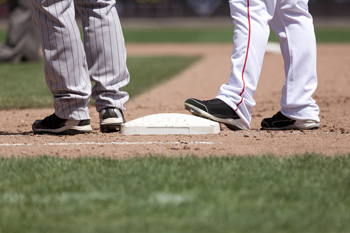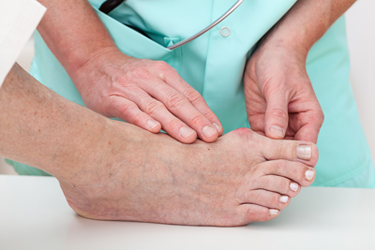Items filtered by date: September 2020
What is a Lisfranc Injury?
 The five metatarsal bones, plus the tendons and ligaments that create the arch at the top of the foot and connect the midfoot to the forefoot, are known as the Lisfranc joint complex. These ligaments and tendons can be sprained, or the metatarsal bones can be fractured, resulting in what is known as a “Lisfranc injury.” Usually this injury is caused by either trauma to the foot or a sudden force and rotation to the midfoot. If there are no fractures or complete tears, a cast will likely be needed for around six weeks before starting rehab. However, most Lisfranc injury cases will require a surgery that realigns the structures to ensure proper healing, and recovery time can take as long as six months. If you have experienced a Lisfranc injury or would like more information, make sure to consult with your podiatrist.
The five metatarsal bones, plus the tendons and ligaments that create the arch at the top of the foot and connect the midfoot to the forefoot, are known as the Lisfranc joint complex. These ligaments and tendons can be sprained, or the metatarsal bones can be fractured, resulting in what is known as a “Lisfranc injury.” Usually this injury is caused by either trauma to the foot or a sudden force and rotation to the midfoot. If there are no fractures or complete tears, a cast will likely be needed for around six weeks before starting rehab. However, most Lisfranc injury cases will require a surgery that realigns the structures to ensure proper healing, and recovery time can take as long as six months. If you have experienced a Lisfranc injury or would like more information, make sure to consult with your podiatrist.
Sports related foot and ankle injuries require proper treatment before players can go back to their regular routines. For more information, contact Dr. John Branwell of Kearny, New Jersey. Our doctor can provide the care you need to keep you pain-free and on your feet.
Sports Related Foot and Ankle Injuries
Foot and ankle injuries are a common occurrence when it comes to athletes of any sport. While many athletes dismiss the initial aches and pains, the truth is that ignoring potential foot and ankle injuries can lead to serious problems. As athletes continue to place pressure and strain the area further, a mild injury can turn into something as serious as a rupture and may lead to a permanent disability. There are many factors that contribute to sports related foot and ankle injuries, which include failure to warm up properly, not providing support or wearing bad footwear. Common injuries and conditions athletes face, including:
- Plantar Fasciitis
- Plantar Fasciosis
- Achilles Tendinitis
- Achilles Tendon Rupture
- Ankle Sprains
Sports related injuries are commonly treated using the RICE method. This includes rest, applying ice to the injured area, compression and elevating the ankle. More serious sprains and injuries may require surgery, which could include arthroscopic and reconstructive surgery. Rehabilitation and therapy may also be required in order to get any recovering athlete to become fully functional again. Any unusual aches and pains an athlete sustains must be evaluated by a licensed, reputable medical professional.
If you have any questions please feel free to contact our office located in Kearny, NJ . We offer the newest diagnostic and treatment technologies for all your foot and ankle needs.
Nonsurgical Treatments for Bunions
 If you have a bunion, a bony bump on the side of the big toe, you may have heard that surgery is needed to treat the pain that it causes. This is not necessarily true, as there are nonsurgical treatments for bunions as well. Changing your shoes to a pair that are wider and more supportive, wearing orthotics, wearing pads placed over the bunion, avoiding activities that cause bunion pain, taking nonsteroidal anti-inflammatory medications, or icing the foot can all help ease your pain. If nonsurgical treatments do not provide much relief, or if the pain from your bunion is severe enough to interfere with daily activities, then it may be time to consider surgery. If you are suffering from bunions, it is recommended that you see a podiatrist for treatment.
If you have a bunion, a bony bump on the side of the big toe, you may have heard that surgery is needed to treat the pain that it causes. This is not necessarily true, as there are nonsurgical treatments for bunions as well. Changing your shoes to a pair that are wider and more supportive, wearing orthotics, wearing pads placed over the bunion, avoiding activities that cause bunion pain, taking nonsteroidal anti-inflammatory medications, or icing the foot can all help ease your pain. If nonsurgical treatments do not provide much relief, or if the pain from your bunion is severe enough to interfere with daily activities, then it may be time to consider surgery. If you are suffering from bunions, it is recommended that you see a podiatrist for treatment.
If you are suffering from bunions, contact Dr. John Branwell of Kearny, New Jersey. Our doctor can provide the care you need to keep you pain-free and on your feet.
What Is a Bunion?
A bunion is formed of swollen tissue or an enlargement of boney growth, usually located at the base joint of the toe that connects to the foot. The swelling occurs due to the bones in the big toe shifting inward, which impacts the other toes of the foot. This causes the area around the base of the big toe to become inflamed and painful.
Why Do Bunions Form?
Genetics – Susceptibility to bunions are often hereditary
Stress on the feet – Poorly fitted and uncomfortable footwear that places stress on feet, such as heels, can worsen existing bunions
How Are Bunions Diagnosed?
Doctors often perform two tests – blood tests and x-rays – when trying to diagnose bunions, especially in the early stages of development. Blood tests help determine if the foot pain is being caused by something else, such as arthritis, while x-rays provide a clear picture of your bone structure to your doctor.
How Are Bunions Treated?
- Refrain from wearing heels or similar shoes that cause discomfort
- Select wider shoes that can provide more comfort and reduce pain
- Anti-inflammatory and pain management drugs
- Orthotics or foot inserts
- Surgery
If you have any questions, please feel free to contact our office located in Kearny, NJ . We offer the newest diagnostic and treatment technologies for all your foot care needs.
Do you Stand at Work?
 People who have jobs that require them to stand for the majority of the day may be prone to developing foot conditions. There are also people who must stand at a computer work station all day and may experience general pain and fatigue in their feet. This is why it is beneficial to incorporate successful strategies for foot health into the work day. These can include maintaining a correct standing posture, which can consist of keeping the toes pointed forward, and ensuring that the feet are lying flat on the floor. It is helpful to walk for a short amount of time every hour, in addition to performing mobility exercises. Lastly, wearing shoes that are comfortable, supportive, and match your particular job, are essential to keeping the feet safe and protected. These are a few methods that may help to keep your feet healthy during the work day, and it is suggested that you consult with a podiatrist to learn more about the techniques that are best for you.
People who have jobs that require them to stand for the majority of the day may be prone to developing foot conditions. There are also people who must stand at a computer work station all day and may experience general pain and fatigue in their feet. This is why it is beneficial to incorporate successful strategies for foot health into the work day. These can include maintaining a correct standing posture, which can consist of keeping the toes pointed forward, and ensuring that the feet are lying flat on the floor. It is helpful to walk for a short amount of time every hour, in addition to performing mobility exercises. Lastly, wearing shoes that are comfortable, supportive, and match your particular job, are essential to keeping the feet safe and protected. These are a few methods that may help to keep your feet healthy during the work day, and it is suggested that you consult with a podiatrist to learn more about the techniques that are best for you.
While working on the feet, it is important to take the proper care of them. For more information about working on your feet, contact Dr. John Branwell from Kearny, New Jersey. Our doctor will treat your foot and ankle needs.
Working on Your Feet
Standing on your feet for long periods of time can cause stress and pain in your feet. Your whole body may experience change in terms of posture, back pain, bunions, callouses and or plantar warts. There are ways to avoid these conditions with proper foot care, smart choices and correct posture.
Positive Changes
Negative heeled shoe – Choosing this shoe type places the heel slightly lower than the ball of the foot. These are great for overall foot health. Find shoes that fit you correctly.
Go barefoot – Our feet were not designed to be enclosed for all hours of the day. Try to periodically expose your feet to air.
Eliminate Pain
Foot Exercises – Performing simple exercises, incorporating yoga and doing stretches are beneficial. This will allow increased blood flow to the area and muscles of the foot.
Achilles tendon – Stretching the foot out flat on the floor will relax the calf muscles and tendon. These exercises can be performed almost anywhere. Make sure you add these exercises to your daily regimen.
With a little bit of this information and knowing more about foot health, you will notice changes. Foot stretches and proper footwear will help with pain and prevent further issues.
If you have any questions please feel free to contact our office located in Kearny, NJ . We offer the newest diagnostic and treatment technologies for all your foot and ankle needs.
Read more about Working on Your FeetDo you Stand at Work?
 People who have jobs that require them to stand for the majority of the day may be prone to developing foot conditions. There are also people who must stand at a computer work station all day and may experience general pain and fatigue in their feet. This is why it is beneficial to incorporate successful strategies for foot health into the work day. These can include maintaining a correct standing posture, which can consist of keeping the toes pointed forward, and ensuring that the feet are lying flat on the floor. It is helpful to walk for a short amount of time every hour, in addition to performing mobility exercises. Lastly, wearing shoes that are comfortable, supportive, and match your particular job, are essential to keeping the feet safe and protected. These are a few methods that may help to keep your feet healthy during the work day, and it is suggested that you consult with a podiatrist to learn more about the techniques that are best for you.
People who have jobs that require them to stand for the majority of the day may be prone to developing foot conditions. There are also people who must stand at a computer work station all day and may experience general pain and fatigue in their feet. This is why it is beneficial to incorporate successful strategies for foot health into the work day. These can include maintaining a correct standing posture, which can consist of keeping the toes pointed forward, and ensuring that the feet are lying flat on the floor. It is helpful to walk for a short amount of time every hour, in addition to performing mobility exercises. Lastly, wearing shoes that are comfortable, supportive, and match your particular job, are essential to keeping the feet safe and protected. These are a few methods that may help to keep your feet healthy during the work day, and it is suggested that you consult with a podiatrist to learn more about the techniques that are best for you.
While working on the feet, it is important to take the proper care of them. For more information about working on your feet, contact Dr. John Branwell from Kearny, New Jersey. Our doctor will treat your foot and ankle needs.
Working on Your Feet
Standing on your feet for long periods of time can cause stress and pain in your feet. Your whole body may experience change in terms of posture, back pain, bunions, callouses and or plantar warts. There are ways to avoid these conditions with proper foot care, smart choices and correct posture.
Positive Changes
Negative heeled shoe – Choosing this shoe type places the heel slightly lower than the ball of the foot. These are great for overall foot health. Find shoes that fit you correctly.
Go barefoot – Our feet were not designed to be enclosed for all hours of the day. Try to periodically expose your feet to air.
Eliminate Pain
Foot Exercises – Performing simple exercises, incorporating yoga and doing stretches are beneficial. This will allow increased blood flow to the area and muscles of the foot.
Achilles tendon – Stretching the foot out flat on the floor will relax the calf muscles and tendon. These exercises can be performed almost anywhere. Make sure you add these exercises to your daily regimen.
With a little bit of this information and knowing more about foot health, you will notice changes. Foot stretches and proper footwear will help with pain and prevent further issues.
If you have any questions please feel free to contact our office located in Kearny, NJ . We offer the newest diagnostic and treatment technologies for all your foot and ankle needs.
